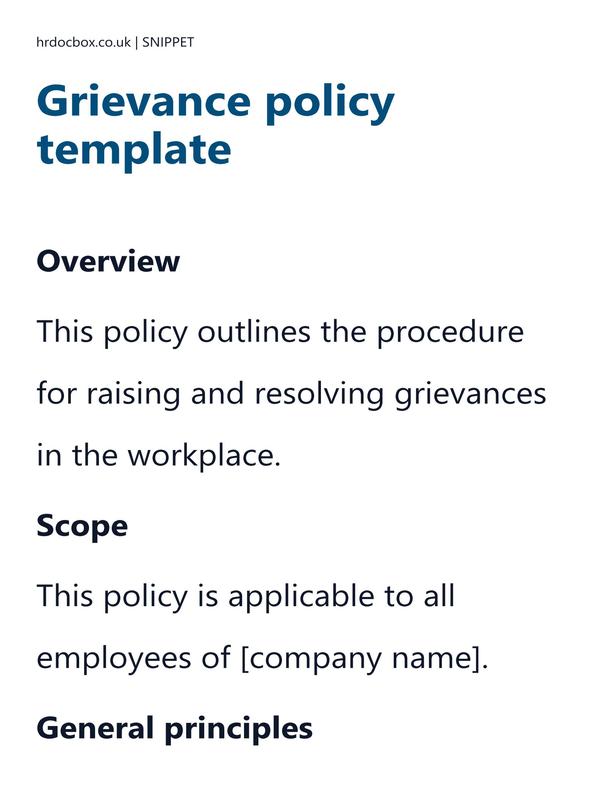Grievance policy template


Our Grievance Policy template helps address and resolve employee complaints systematically and effectively, ensuring a fair process for all parties involved.
- Includes Grievance policy template, plus 12 months’ access with all updates provided free of charge and notified to you.
- UK-specific accuracy.
- 749 words over 2 pages.
- Last updated 20/11/2024.
- Format: Word / plain text / email.
- Delivery: Instant download after purchase (no physical item).
- Access: Download link shown here after checkout.
- This Grievance policy template will SAVE you up to 1 hour 30 mins drafting & research. Save cost. Reduce risk.
Grievance policy
1 Overview
1.1 This policy outlines the procedure for raising and resolving grievances in the workplace.
2 Scope
2.1 This policy is applicable to all employees of [company name].
3 General principles
3.1 A grievance refers to any issue, complaint, or concern an employee may have regarding their treatment, working conditions, or work environment. The organisation is committed to resolving grievances fairly and promptly and encourages employees to raise concerns in a constructive manner.
3.2 The grievance process is designed to ensure that complaints are addressed with due seriousness and respect. Employees are encouraged to use this procedure when they feel their issues cannot be resolved informally.
3.1 Informal Resolution
3.1.1 If you are dissatisfied with your treatment or any aspect of your work, we encourage you to raise the issue informally with your line manager. In many cases, an open conversation can resolve the matter without the need for formal procedures. If you are uncomfortable discussing the matter with your line manager, you may approach the HR Manager for support.
3.1.2 While informal discussions are encouraged, if these do not lead to a satisfactory resolution, you may choose to raise the matter formally through the grievance procedure.
3.2 Formal Grievance Procedure
If your issue cannot be resolved informally, you may submit a formal grievance. A formal grievance involves writing to your line manager (or HR manager if the grievance concerns your line manager). You should clearly set
This is a 30% preview of the Grievance policy template. For instant full access, purchase this item or a parent bundle.
Grievance policy template purpose
The Grievance Policy outlines the procedures for addressing employee concerns and disputes within the workplace. It provides a structured framework for employees to raise issues related to their employment, ensuring that grievances are handled fairly, consistently, and promptly.
By adhering to this policy, organisations can maintain a harmonious work environment, mitigate conflicts, and promote open communication. The policy ensures that all grievances are thoroughly investigated and resolved in a manner that upholds the rights of all parties involved, fostering trust and transparency within the organisation.
Practical application of a Grievance policy template
- Issue the Grievance policy template during onboarding / after changes / planned refresher.
- Send it to appropriate internal recipients such as employees, workers, contractors etc. and request confirmation that is has been read and understood.
Compliance
Compliance
This Grievance policy template incorporates relevant UK laws and HR standards, including those listed below:
-
Employment Rights Act 1996: Provides the framework for employees to raise grievances and ensures they are treated fairly throughout the process.
-
Equality Act 2010: Ensures that grievance procedures are non-discriminatory and provide equal opportunities for all employees to have their concerns addressed.
-
Acas Code of Practice on Disciplinary and Grievance Procedures: Offers detailed guidelines on how to handle grievances effectively and fairly, recommending a clear, structured process.
-
Data Protection Act 2018 (incorporating GDPR): Requires that any personal data collected during the grievance process is handled confidentially and in compliance with data protection principles.
-
Best Practice: Clear Communication and Documentation: Ensure grievance procedures are clearly communicated to all employees and that thorough documentation is maintained throughout the process to support transparency and accountability.
Frequently Asked Questions about a Grievance policy template
Frequently Asked Questions about a Grievance policy template
-
Can I use the Grievance policy template in my small business?
Yes. The Grievance policy template is designed to be flexible and suitable for organisations of all sizes, including small businesses and charities. It follows UK employment law best practice, so even if you don't have an in-house HR team, you can confidently apply it.
-
Is the Grievance policy template compliant with 2026 UK employment law?
Absolutely. Like the Grievance policy template, all of our templates are drafted with the latest ACAS guidance and UK employment legislation in mind. We review and update them regularly, so you can be confident they remain compliant.
-
Can I customise the Grievance policy template for my organisation?
Yes, we highlight the areas of the Grievance policy template that you need to update with your own details, and where you need to make decisions to suit your situation. This saves you time and ensures that you meet best practice.
-
Do I get instant access to the Grievance policy template?
Yes. Once purchased, you'll be able to download the Grievance policy template instantly. Templates are provided in editable Word or Excel format so you can customise them easily, and in PDF format for easy sharing.
-
What if I need more help, not just a Grievance policy template?
If you're looking for broader support, we also offer toolkits and library bundles that include the Grievance policy template, along with other HR templates and policies for fully managing your situation. These may be more cost-effective if you need deeper advice.
-
Why should I use this Grievance policy template, and not AI to generate it?
The risk of using a free AI-generated template 'without review' includes your legal exposure, missing context, and no awareness of the wider process, whereas purchasing the Grievance policy template from us mitigates that risk.
